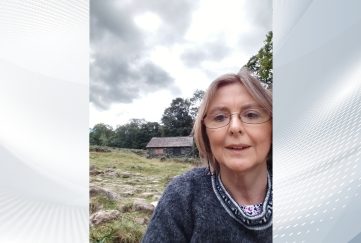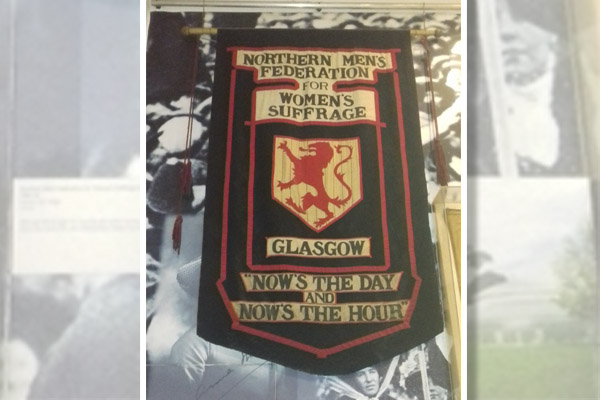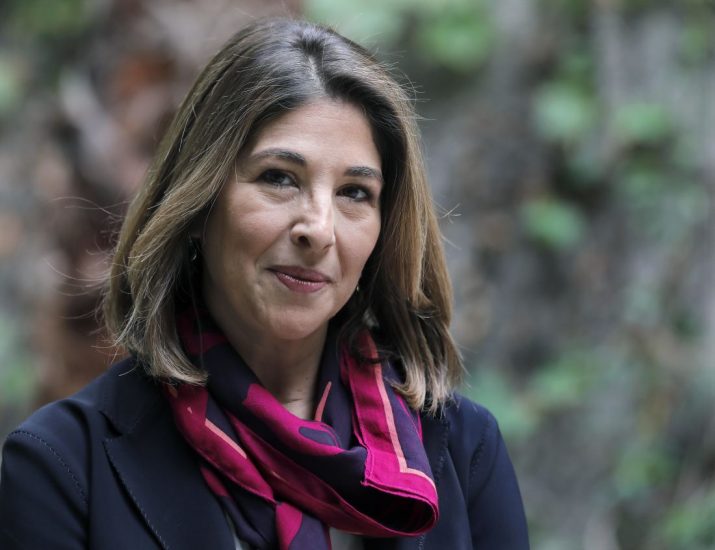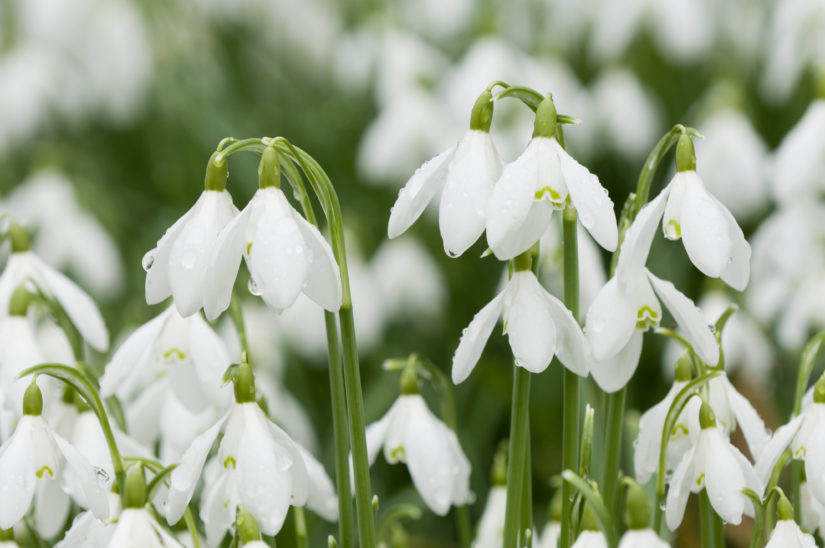Remembrance Day Story: “Hope Springs Eternal” By Annie Harris
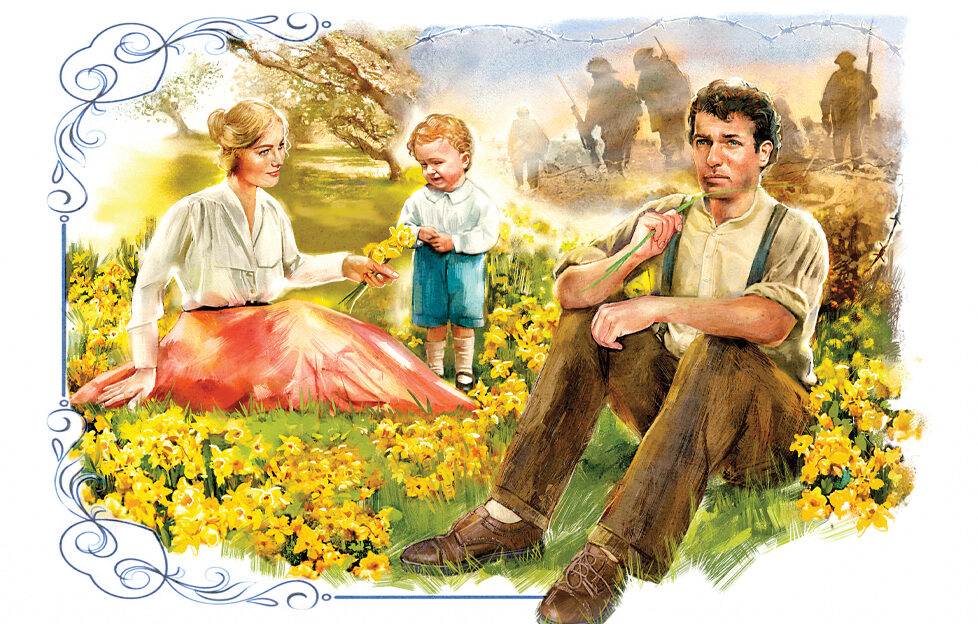
To honour Remembrance Day, we’re sharing Annie Harris’ story “Hope Springs Eternal”. First published in The People’s Friend November 7, 2020.
Set during WW1
Jan had always loved the daffodils, but it was hard to find joy in anything right now . . .
Let’s leave the washing-up and have a walk, Jan.”
“Go for a walk, Ralph?” Jan stared at her husband.
“But you never go for a walk. You do enough walking in the fields during the week.”
“I know.” Her husband flicked the kitchen towel at her.
“But it’s Sunday, the sun’s shining for once, and Frank and I were ploughing with the team in Ten Acre meadow and the daffs are out in the wood.”
Jan’s heart lifted. The wild daffodils, the glorious haze of gold that every spring filled their corner of Gloucestershire.
Then her face clouded.
“I’ve got such a lot to do, love. A load of ironing . . .”
“The ironing will wait – the daffs won’t.” Ralph caught her round the waist and kissed her.
“Jackie was too young last year. You’ll like them, won’t you, son?”
He chucked the toddler under the chin and received a gappy smile in return.
* * * *
Jan pulled off a stem of goose grass and used it to tie the bunch of daffodils she had gathered.
“Look, lovey, Mummy’s flowers.” She held them out to the child. “Pretty.”
“Pretty,” Jackie echoed. He bent his nose into the flowers then sneezed.
“Bless you!” his father said. “Come and sit down, love. Have a rest.”
Jan sank down, leaned back and closed her eyes.
The sunlight flickered across her eyelids, and the scents of spring drifted out from the wood.
The worry and fear briefly faded from her.
Here, in this tiny corner of England, the war seemed far away.
“Pretty.”
She heard Jackie’s voice again, and opened her eyes to see him inspecting a fat bumblebee nuzzling into a daffodil heart and poking a podgy finger at it.
“Don’t do that, sweetie,” Jan said. “It might sting you.”
Jan looked at Ralph, who was nibbling a blade of grass, his face sombre.
Her stomach contracted with sudden premonition, but she said lightly, “Penny for them.”
“Sit down, Jan.” She didn’t want to. She wanted to run, not hear the words.
“I’m enlisting, love. Frank and I are going into Gloucester on Friday.”
“But you’re needed here, on the farm. What will John Forster do without his best hands? The country still has to be fed, doesn’t it?”
“He’s getting two conchies. He’ll be fine.”
“And Frank – he’s the only one who can keep that new tractor of John’s running.
“And he’s all his mother’s got since his dad died. And your foot!” Jan knew she was babbling.
“It’s never been the same since the carthorse trod on it. You’re still limping. They won’t want you.”
“They want every man they can get, Jan. But it’ll be over soon.”
“They said it would be over by Christmas. And that was two years ago.”
“Yes, well.” He got up and took Jackie from her, kissing the child’s cheek.
“Don’t you worry, love. We’ll all be back here next year to see the daffs.”
He put his arm round her and she laid her head on his shoulder.
For a moment, they stood in silence, the flowers at their feet, then walked home.
* * * *
Jan looked through the kitchen window. Ralph was sitting on their rickety bench, staring into space.
It had been a full year since Ralph had enlisted, in March 1916.
She’d been so looking forward to his leave, but it was almost like having a stranger in the house.
Ralph had arrived with Fred on the carrier’s cart two days ago, so half his leave was already over.
Jan stooped to get the pie out of the range.
“Jackie, tell your dad dinner’s on the table.”
When the pair came in Ralph seemed brighter.
“Oh, that pie looks good, Jan,” he said as she cut him a slice and added swede.
“It’s venison. Meat’s getting very dear, but you know Godfrey, the old gamekeeper?
“He always remembers us when he culls an old deer or pigeon.
“Mr Forster gave me a lovely chicken at Christmas. I told you in my letter. You did get it, didn’t you, love?”
“What? Oh, yes – thank you. I should’ve written but – we were a bit busy,” he added in a flat tone.
“This pie’s really good. Any chance of seconds?”
“Of course.”
The first couple of days of his leave, Ralph had had no appetite at all.
Now he was unable to have enough.
“There’s an apple tart to follow,” she said. “The last of the Bramleys that I stored in the autumn.”
“Yes, you told me.”
“And Jackie helped me wrap them in newspaper, didn’t you, lovey?”
“Yes.”
“Well done.” Ralph ruffled the child’s curls. “You’ll be a man for your mother, won’t you, son? If . . .” Ralph broke off.
“The daffs are out. When I’ve cleared up, let’s go and look at them, shall we? They’re a lovely show this year,” Jan said quickly.
They walked through the wood, where the daffodils mingled with the delicate wood anemones.
The orchard beyond, full of gnarled old cider apple trees, was a sea of gold.
Jan shot a glance at her husband. He was gazing beyond the orchard.
That Long Look, as Ted, the publican of the Crown, called it – the look of men who’d gazed into the jaws of hell itself.
Jan put her hand on Ralph’s.
“It’ll be over soon, love. You’ll be back ploughing this time next year and we’ll all be as we were.”
“Yes, Jan.” Ralph forced a smile. “Come on, Jackie, lad. Let’s go home.”
* * * *
March 1918
My dearest Ralph,
Thank you for your letter. Some of it had been blacked out, so I don’t know where you are, but I was happy to hear that you are fit and well and hoping for leave in a few weeks.
I read it with Jackie. He is really good at his letters now, and says he is going to write a letter to go with the picture he has done for you of the daffodils.
We walked there on Sunday and he picked a bunch for me.
We saw Frank on Wednesday. He’s not been well and has been back in England to recover.
He’d come to see his mother and called on us.
He took Jackie for a ride on his pushbike, and chopped some logs for me from that old cider tree in the hedge. I told you it fell down in the winter and –
A rattle of rain against the window-pane made Jan jump.
The washing!
She leaped up and ran to the line but then stood, watching the telegraph boy turn into the lane.
Her stomach clenched as he came slowly closer.
He got off his bike, leaned it against her neighbour’s hedge and went up the path.
“Oh, thank God,” she said aloud, then hated herself. She’d go along later, see if there was anything she could do.
As she stood watching, the post boy reappeared and mounted his bicycle.
He came towards her, then stopped. They stared at one another.
Billy was simple, so he wouldn’t be going to France, but he knew what was going on.
“Sorry, Mrs Parsons.” He touched his cap and handed her the envelope.
* * * *
The wind came chill down Whitehall. Jan shivered in her coat and pulled Jackie closer to her.
They had arrived early and were almost opposite the Cenotaph, still veiled in Union flags.
A military band began to play a haunting melody and a group of men in Army greatcoats took up their positions, standing stiffly.
“There’s the King . . . Look, there’s King George.”
Jan heard the whispers and strained to glimpse the figure in Field-Marshal’s uniform.
Then, in the distance, came the sound of marching feet, and an even deeper hush fell.
A man moved in front of her, but a burly policeman edged her forward.
“Lose him, did you, love?”
“Mmm.”
He looked at Jackie, growing tall, like Ralph, and wearing his medal.
“You can be proud of your dad, lad.”
The rumble of the carriage bearing the coffin of the Unknown Warrior could be heard, and the jingle of harness of the black-plumed horses.
They halted near the King. An equerry handed him a wreath of scarlet poppies, and he laid it on the coffin, saluted, stepped back and bowed his head.
In the distance the solemn chimes of Big Ben began to sound.
Eleven o’clock, the exact hour when the guns had fallen silent two years ago.
No-one moved. It was as though the whole nation was holding its breath.
The King pressed a switch on a plinth and the flags fell to reveal the monument with its simple inscription, The Glorious Dead.
The King laid a wreath at its foot, the poppies like a splash of blood against the pale stone.
Then it was over.
The procession moved on towards Westminster Abbey. Only when the last sounds had died away did the crowd start to disperse.
Jan wiped her eyes, took Jack’s hand so as not to lose him and turned to go.
“Jan!” A man’s hand caught her arm and she swung round.
“Frank!” She stared at him in disbelief. “How did you get here?”
Frank smiled faintly.
“Oh, I live in London now. You know that Mum died? Well, there was nothing to go back for.
“But I couldn’t miss today. I owed it to Ralph and all the others.”
Frank looked down at Jack and bit his lip.
“He’s the image of his dad. Hello, Jackie. Remember me?”
“You gave me a ride on your bike.”
“So I did, lad.” He shook his head sadly. “It seems a lifetime ago.”
“Are you still in farming?”
“No, Jan – impossible with my poor old lungs.
“I’m a mechanic at a garage near here. What about you? You’re a long way from home.”
“We’re staying with my cousin. She knew how much I wanted to be here today.
“But we’re going back tomorrow. I’ve got a job as maid up at the manor.”
“I see.”
She was conscious of him taking in her threadbare coat.
“We’re fine, Frank.”
“Good. But Jan, my boss is from Gloucester and he’s opening another garage there next year.
“He’s offered me the chance to move back. If it comes off, could I come and see you both?”
“We’d love to see you, wouldn’t we, Jackie?”
“Will you bring your bike?”
“I’ll do better than that, lad. I’ll bring a motor car.”
“Oh.” The boy sighed in rapture and they laughed.
“Better get on. I’ve got a job to finish,” Frank said. “Take care of yourselves.”
“And you, Frank.” Jan hesitated then hugged him quickly. “God bless.”
“Maybe we’ll go and see the daffodils. You know, when we were in hell, we – I dreamed of them.”
The daffodils. She’d refused to go near them for two long years. When Billy brought her a large bunch she’d thanked him, then thrown them in the bin.
Jan summoned a smile.
“Yes, Frank. We’ll go and see them.”
As she watched him walk away, Jan thought back to what Ralph had said on his last leave. “Wars always end, love. And the daffodils will always come, to give us hope of a better tomorrow.”
Read some Remembrance Day poems from the “Friend”.



